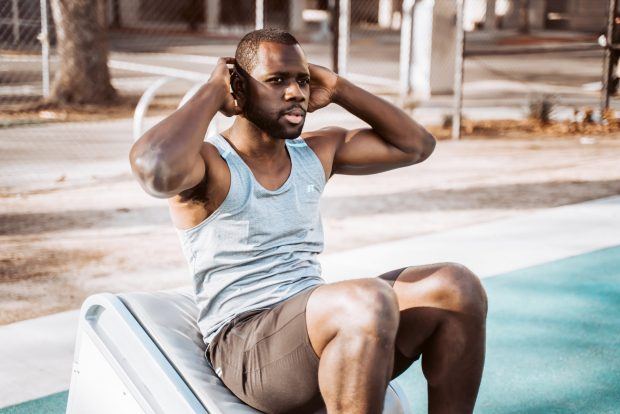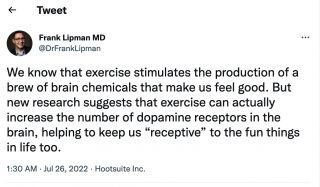Exercise is a crucial lifestyle habit and one of the most powerful ways to improve your well-being. From weight loss and strengthening the heart to boosting your brain, the benefits are countless. In this article, we look at what makes exercise such an important longevity factor and how much exercise is needed to live a happier, healthier life.
Consider the incredible longevity benefits of exercise
There are thousands of scientific studies that have shown how regular physical activity reduces the risk of heart disease, stroke, and type 2 diabetes. Regular physical activity also reduces the risk of breast and colon cancer, and depression, and will even reduce falls as you age.
Physical activity improves sleep and endurance, and you’ll have better sex too!
Yes, you will live longer
Regular physical activity reduces the risk of premature death from any cause. Harvard scientists report that when you exercise, your muscles release natural substances that help relax blood vessel walls.
It lowers blood pressure, reduces “bad” LDL cholesterol, and increases “good” HDL cholesterol. It also moves glucose out of the bloodstream and into the cells where it is needed, lowering insulin levels and reducing inflammation.
Research shows that modest increments in energy expenditure due to physical activity (∼1000 kcal per week) or an increase in physical fitness of 1 MET (metabolic equivalent) is associated with lowering mortality by about 20%.
When you don’t exercise, this is what happens…
Physically inactive middle-aged women (engaging in less than 1 hour of exercise per week) experienced a 52% increase in all-cause mortality. The same research showed a doubling of cardiovascular-related mortality and a 29% increase in cancer-related mortality when compared with physically active ones.
Your brain will work better
Voluntary exercise has been shown to increase these brain-derived neurotrophic factors (Neeper et al., 1996). Brain-derived neurotrophic factors (BDNF) can enhance the survival and differentiation of neurons.
In moderate doses, it causes pronounced relaxing effects on the majority of the population. It can also improve the cognitive functioning of people with dementia.
Reduces your risk of heart disease
“One of the key benefits of exercise is that it helps to control or modify any of the risk factors for heart disease,” says Dr. Kerry Stewart, director of Clinical and Research Exercise Physiology at Johns Hopkins Bayview. “Smoking is another big factor for heart disease, and if you exercise regularly you’re unlikely to take on a bad habit like smoking, or quit if you already are a smoker.”
Additional benefits of exercise:
- Improves the muscles’ ability to pull oxygen out of the blood. This reduces the need for the heart to pump more blood to the muscles
- Reduces stress hormones that can put an extra burden on the heart
- Works like a beta blocker to slow heart rate and lower blood pressure
- Increases high-density lipoprotein (HDL) or “good” cholesterol and helps control triglycerides
A number of studies show that people who exercise regularly are less likely to suffer a sudden heart attack or other life-threatening cardiac events.

Treat depression and anxiety
Researchers believe that in some cases, exercise can be a treatment on its own for depression and anxiety.
Exercise can be like taking a psychoactive drug. This is not a far-fetched idea. Scientists looked at molecular signaling pathways in the brain and found that exercise was so powerful it had the same effect as a psychoactive drug.
“In moderate doses, it causes very pronounced relaxing effects on the majority of the population, but some persons may even become addicted to exercise. Finally, there may be some contra-indications to exercise that arise when people are severely ill, and these are described in the final section of the review. Our general conclusion is that exercise is so effective that it should be considered as a drug, but that more attention should be paid to the dosing and to individual variations between patients.” J Vina, F Sanchis-Gomar, V Martinez-Bello, and MC Gomez-Cabrera – published in the National Library of Medicine.
Helps you enjoy the fun things in life
Frank Lipman MD posted this on Twitter @DrFrankLipman recently.
“We know that exercise stimulates the production of a brew of brain chemicals that make us feel good. But new research suggests that exercise can actually increase the number of dopamine receptors in the brain, helping to keep us “receptive” to the fun things in life too.”
 Reduce pain
Reduce pain
Other studies have shown that post-meal walking helps regulate blood sugar levels; strengthens the body and flexibility. Exercise can reduce pain from hip and knee arthritis.
Exercise will help you lose weight
And yes, if you exercise and follow a healthy balanced diet you will lose weight.
According to Johns Hopkins, “Exercise alone can help with weight loss over a long period of time. But a short-term approach is to reduce the number of calories you take in through diet while increasing the calories you use through exercise.”
When losing weight, more physical activity increases the number of calories your body uses for energy or “burns off.” The burning of calories through physical activity, combined with reducing the number of calories you eat, creates a “calorie deficit” that results in weight loss.” – Physical Activity for a Healthy Weight, Centre for Disease Control and Prevention.
How much exercise and how often?
Unlike chemical drugs, when it comes to physical activity, the minimum and maximum safe doses of physical activity are not well understood.
There’s still a lot of debate on how much, what type, how often, what intensity, and how long we should exercise. Over the years, various expert groups have proposed different physical activity recommendations and guidelines. This table summarizes these: Table 1 Sourced from the British Journal of Pharmacology.
Historical evolution in physical activity recommendations and guidelines. Table 1.
|
Physical activity recommendations |
||||
|
Intensity |
Minutes |
Frequency |
Reference |
|
|
1970s–1980s |
Vigorous exercise (e.g. running) |
20 min·day−1 |
3 times·week−1 |
(American College of Sports Medicine, 1978) |
|
1990s |
Moderate exercise (e.g. brisk walking) |
30 min·day−1 |
Most days of the week |
(Pate et al., 1995; Physical activity and cardiovascular health, 1996) |
|
2000s |
Moderate exercise |
60 min·day−1 |
3 times·week−1 |
(Lee, 2007) |
|
2010 (healthy adults ages 18–45) |
Moderate exercise |
30 min·day−1 (150 min week−1) |
Most days of the week (5 days·week−1) |
(O’Donovan et al., 2010) |
|
Vigorous exercise |
75 min·week−1 |
(O’Donovan et al., 2010) |
||
The bottom line
We all need to exercise enough to improve longevity. Exercising at even 50% of the recommended levels (72 min of moderate exercise a week) may be sufficient to provide some improvement in fitness. However, researchers say at this level cardiovascular risk factors (blood pressure, lipid profile, and weight) will not improve.

Photo by Fortune Vieyra on Unsplash
Easy tips to remember
- Aim for half an hour of moderate physical activity most days of the week, or 150 minutes a week. If that seems daunting, then start with a few minutes a day and increase the amount you exercise by five or 10 minutes every week until you reach your goal.
- If you don’t want to walk, consider other moderate-intensity exercises. Swimming, stair climbing, tennis, or dancing are great alternatives. Don’t forget that household activities can count as well. Anything that gets your heart pumping so much that you break out in a light sweat will count.
- Join a class, or work out with a friend who’ll hold you accountable. A good habit is to develop is to build movement into your everyday activities: take walks and climb stairs to get where you’re going; take a break at your desk and do some calisthenics or yoga poses; do anything other than sitting in one spot for prolonged periods of time.Download an app and track your progress, which encourages you to reach a goal. Use a pedometer or a digital fitness monitor to count steps.
- And if you aren’t able to perform the moderate-intensity exercise, remember: even light activity can make a difference in your health.
The case for exercise is strong. Without a doubt, if you exercise consistently, you will improve your longevity.



![exercise [longevity live]](https://longevitylive.com/wp-content/uploads/2019/08/athletes-exercise-feet-2526878-620x349.jpg)
 Reduce pain
Reduce pain 1,2
1,2 ![women [longevity live]](https://longevitylive.com/wp-content/uploads/2020/01/photo-of-women-walking-down-the-street-1116984-100x100.jpg)










